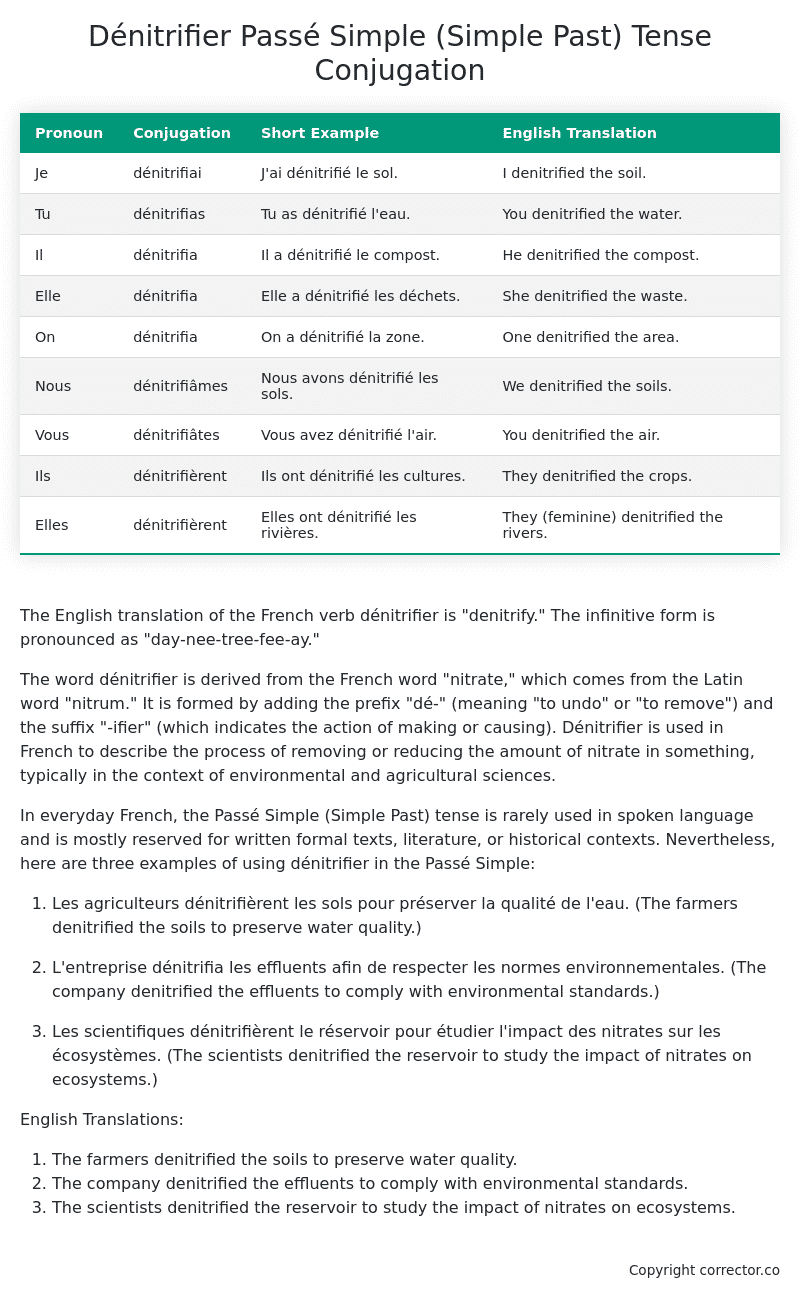Passé Simple (Simple Past) Tense Conjugation of the French Verb dénitrifier
Introduction to the verb dénitrifier
The English translation of the French verb dénitrifier is “denitrify.” The infinitive form is pronounced as “day-nee-tree-fee-ay.”
The word dénitrifier is derived from the French word “nitrate,” which comes from the Latin word “nitrum.” It is formed by adding the prefix “dé-” (meaning “to undo” or “to remove”) and the suffix “-ifier” (which indicates the action of making or causing). Dénitrifier is used in French to describe the process of removing or reducing the amount of nitrate in something, typically in the context of environmental and agricultural sciences.
In everyday French, the Passé Simple (Simple Past) tense is rarely used in spoken language and is mostly reserved for written formal texts, literature, or historical contexts. Nevertheless, here are three examples of using dénitrifier in the Passé Simple:
-
Les agriculteurs dénitrifièrent les sols pour préserver la qualité de l’eau.
(The farmers denitrified the soils to preserve water quality.) -
L’entreprise dénitrifia les effluents afin de respecter les normes environnementales.
(The company denitrified the effluents to comply with environmental standards.) -
Les scientifiques dénitrifièrent le réservoir pour étudier l’impact des nitrates sur les écosystèmes.
(The scientists denitrified the reservoir to study the impact of nitrates on ecosystems.)
English Translations:
- The farmers denitrified the soils to preserve water quality.
- The company denitrified the effluents to comply with environmental standards.
- The scientists denitrified the reservoir to study the impact of nitrates on ecosystems.
Table of the Passé Simple (Simple Past) Tense Conjugation of dénitrifier
| Pronoun | Conjugation | Short Example | English Translation |
|---|---|---|---|
| Je | dénitrifiai | J’ai dénitrifié le sol. | I denitrified the soil. |
| Tu | dénitrifias | Tu as dénitrifié l’eau. | You denitrified the water. |
| Il | dénitrifia | Il a dénitrifié le compost. | He denitrified the compost. |
| Elle | dénitrifia | Elle a dénitrifié les déchets. | She denitrified the waste. |
| On | dénitrifia | On a dénitrifié la zone. | One denitrified the area. |
| Nous | dénitrifiâmes | Nous avons dénitrifié les sols. | We denitrified the soils. |
| Vous | dénitrifiâtes | Vous avez dénitrifié l’air. | You denitrified the air. |
| Ils | dénitrifièrent | Ils ont dénitrifié les cultures. | They denitrified the crops. |
| Elles | dénitrifièrent | Elles ont dénitrifié les rivières. | They (feminine) denitrified the rivers. |
Other Conjugations for Dénitrifier.
Le Present (Present Tense) Conjugation of the French Verb dénitrifier
Imparfait (Imperfect) Tense Conjugation of the French Verb dénitrifier
Passé Simple (Simple Past) Tense Conjugation of the French Verb dénitrifier (You’re reading it right now!)
Passé Composé (Present Perfect) Tense Conjugation of the French Verb dénitrifier
Futur Simple (Simple Future) Tense Conjugation of the French Verb dénitrifier
Futur Proche (Near Future) Tense Conjugation of the French Verb dénitrifier
Plus-que-parfait (Pluperfect) Tense Conjugation of the French Verb dénitrifier
Passé Antérieur (Past Anterior) Tense Conjugation of the French Verb dénitrifier
Futur Antérieur (Future Anterior) Tense Conjugation of the French Verb dénitrifier
Subjonctif Présent (Subjunctive Present) Tense Conjugation of the French Verb dénitrifier
Subjonctif Passé (Subjunctive Past) Tense Conjugation of the French Verb dénitrifier
Subjonctif Imparfait (Subjunctive Imperfect) Tense Conjugation of the French Verb dénitrifier
Conditionnel Présent (Conditional Present) Tense Conjugation of the French Verb dénitrifier
Conditionnel Passé (Conditional Past) Tense Conjugation of the French Verb dénitrifier
Conditionnel Passé II (Conditional Past II) Tense Conjugation of the French Verb dénitrifier
L’impératif Présent (Imperative Present) Tense Conjugation of the French Verb dénitrifier
L’impératif Passé (Imperative Past) Tense Conjugation of the French Verb dénitrifier
L’infinitif Présent (Infinitive Present) Tense Conjugation of the French Verb dénitrifier
L’infinitif Passé (Infinitive Past) Tense Conjugation of the French Verb dénitrifier
Le Participe Présent (Present Participle) Tense Conjugation of the French Verb dénitrifier
Le Participe Passé (Past Participle) Tense Conjugation of the French Verb dénitrifier
Struggling with French verbs or the language in general? Why not use our free French Grammar Checker – no registration required!
Get a FREE Download Study Sheet of this Conjugation 🔥
Simply right click the image below, click “save image” and get your free reference for the dénitrifier Passé Simple tense conjugation!

Dénitrifier – About the French Passé Simple (Simple Past) Tense
Formation
Usage
Narration
Historical Context
Interactions with other tenses
Passé Composé
Imparfait
Conditional and Subjunctive
Summary
I hope you enjoyed this article on the verb dénitrifier. Still in a learning mood? Check out another TOTALLY random French verb conjugation!


